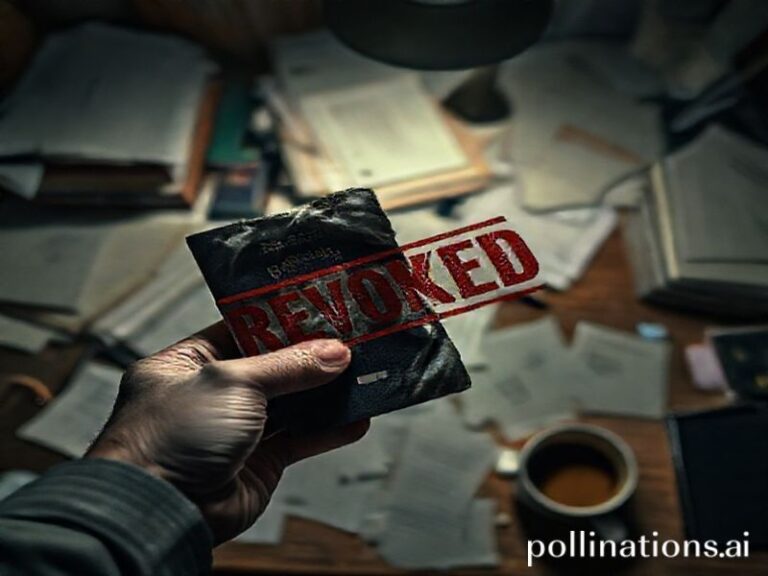Hannah Einbinder: The Comedian Exporting American Anxiety to a Streaming Planet
Hannah Einbinder Is the Canary in Netflix’s Global Coal Mine
By Our Foreign Desk, Somewhere between the 405 and the International Date Line
In the grand, tragicomic opera of 21st-century streaming, Hannah Einbinder has become an unlikely soprano—belting out punch lines sharp enough to draw blood across five continents and counting. The 29-year-old stand-up and Hacks co-star is not, by any traditional metric, a geopolitical force; she owns zero aircraft carriers, controls no lithium mines, and has yet to weaponize a single trade route. Yet her ascent from Los Angeles open-mic exile to Emmy-nominated export item tells us more about how the planet now consumes culture than any WTO white paper ever will.
Observe, if you can stand the glare, the spectacle of Netflix’s Tuesday earnings call: executives in three time zones breathlessly citing “global comedy traction” as a life raft against subscriber mutiny. Translation: audiences from Lagos to Łódź are binging a show whose emotional fulcrum is a Gen-Z burnout writing jokes for a Joan-Rivers-with-survivor’s-guilt diva in Las Vegas. The algorithm, that capricious demigod, has decreed that generational trauma + luxury hotel linens = universal solvent. Somewhere in Davos, a consultant just billed six figures for that equation.
Einbinder herself appears vaguely horrified by the reach. On a recent Zoom junket—streamed live to 47 countries and captioned in Estonian—she compared the experience to “watching your diary get Google-translated by a drunk border agent.” Ever the good millennial, she then apologized to any actual drunk border agents who might have felt stereotyped. The joke landed in Buenos Aires before it finished buffering in Boise, proving that sincerity and snark now travel at the same fatal velocity.
What makes her exportable is precisely what makes her dangerous: specificity that somehow feels indigenous everywhere. Her stand-up mines the neuroses of American upper-middle-class parenting, but parents in Seoul recognize the same weaponized gift wrap; her on-screen panic attacks come with Pepto-Bismol product placement, yet viewers in São Paulo know the flavor of existential nausea all too well. The world has synchronized its anxiety to 120 beats per minute, and Einbinder’s comedic ECG is the readout.
Of course, no empire broadcasts its twilight without some collateral smirk. European censors trimmed a joke about German guilt from the Paris release, which is rather like editing gravity out of a physics lecture. Meanwhile, the Saudi feed blurred a fleeting reference to menstrual cups, because nothing terrifies patriarchy like sustainable feminine hygiene. These edits arrive faster than diplomatic cables used to; the Streisand effect now has its own frequent-flyer lounge.
Economists will note that Einbinder’s international pull translates to soft-power residuals. Tourism boards from Nevada to Tel Aviv clamor for her to tag their locales on Instagram—never mind that her on-screen Vegas is mostly parking garages and fluorescent despair. The Australian government briefly floated a campaign called “Come for the trauma, stay for the beaches,” until someone realized that was already the slogan for half their immigration brochures.
Still, the larger punch line is on us, the rapt, screen-lit billions. We have built a planetary nervous system optimized to deliver one woman’s panic straight to your cortisol receptors at 3 a.m.—HD, Dolby Atmos, auto-play next episode. The same infrastructure that can’t reliably deliver vaccines to the Global South can beam Einbinder’s daddy-issue punch lines to a hut with one bar of signal and a solar panel. Priorities, darling.
Conclusion: In an era when nations weaponize everything from microchips to maple syrup, Hannah Einbinder has become a rare non-lethal export. She traffics in the comedy of personal catastrophe, yet her reach underscores a shared global condition: we are all simultaneously the star and the captive audience of our own tragicomedies. Somewhere, an algorithm chuckles—off-tempo, multilingual, and utterly merciless. The joke, it turns out, is borderless. And the laugh track has already been translated into 37 languages, ready for the next collapse.







